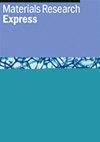Investigation of machining performance of waspaloy using copper-graphite composite electrodes in electric discharge machining
IF 2.2
4区 材料科学
Q3 MATERIALS SCIENCE, MULTIDISCIPLINARY
引用次数: 0
Abstract
This study endeavoured to investigate the machining of Waspaloy using Electric Discharge Machining (EDM), utilizing copper-graphite composites as the tool material. Given the limited existing research on machining Waspaloy with composite tools, this study aims to address this gap by employing a copper-graphite composite tool. In this work, pure copper electrode and three composite electrodes with varying graphite percentages in copper, viz. copper containing 5%, 10%, and 15% graphite (CuGr-5, CuGr-10, and CuGr-15), are utilized for experimentation. Composite electrodes are fabricated by the stir-casting process. The scanning electron microscope reveals that the graphite specks are homogeneously disseminated over the matrix material. The Taguchi mixed orthogonal array was used for developing experimental runs. By varying the current, polarity, pulse on and off times, tool materials, and gap, machining performance was measured in terms of Material Removal Rate (MRR), Tool Wear Rate (TWR), and Surface Roughness (Ra). It was observed that CuGr-5 provides an enhancement in MRR due to the improved electric conductivity, bridging effect, and increased energy concentration at the spark gap. Diverse characteristics witnessed on the surface morphology include black dots, globules, remelted layers, micro-cracks, and scratches. When machined with a CuGr5 electrode, the surface quality improved owing to the completed flushing and uniform distribution of generated heat as confirmed through worn surface morphology. The parameters were optimized utilizing the PROMETHEE optimization technique; it was found that the CuGr-5 electrode with the assessment value 0.02458 was optimal for machining of Waspaloy.在放电加工中使用铜-石墨复合电极对黄铜进行加工的性能研究
本研究试图探讨使用铜石墨复合材料作为工具材料,利用放电加工(EDM)技术加工 Waspaloy 的问题。鉴于现有关于使用复合工具加工 Waspaloy 的研究有限,本研究旨在通过使用铜-石墨复合工具来填补这一空白。在这项工作中,实验使用了纯铜电极和三种石墨在铜中所占比例不同的复合电极,即石墨含量分别为 5%、10% 和 15%(CuGr-5、CuGr-10 和 CuGr-15)的铜电极。复合电极通过搅拌铸造工艺制成。扫描电子显微镜显示,石墨斑点均匀地分布在基体材料上。实验采用田口混合正交阵列。通过改变电流、极性、脉冲开和关时间、刀具材料和间隙,测量了材料去除率(MRR)、刀具磨损率(TWR)和表面粗糙度(Ra)的加工性能。结果表明,CuGr-5 具有更好的导电性、桥接效应和更高的火花间隙能量集中度,从而提高了 MRR。表面形态上的各种特征包括黑点、球状、重熔层、微裂纹和划痕。使用 CuGr5 电极进行加工时,由于完成了冲洗,且产生的热量分布均匀,因此表面质量得到了改善,磨损的表面形态也证实了这一点。利用 PROMETHEE 优化技术对参数进行了优化,发现评估值为 0.02458 的 CuGr-5 电极是加工 Waspaloy 的最佳电极。
本文章由计算机程序翻译,如有差异,请以英文原文为准。
求助全文
约1分钟内获得全文
求助全文
来源期刊

Materials Research Express
MATERIALS SCIENCE, MULTIDISCIPLINARY-
CiteScore
4.50
自引率
4.30%
发文量
640
审稿时长
12 weeks
期刊介绍:
A broad, rapid peer-review journal publishing new experimental and theoretical research on the design, fabrication, properties and applications of all classes of materials.
 求助内容:
求助内容: 应助结果提醒方式:
应助结果提醒方式:


